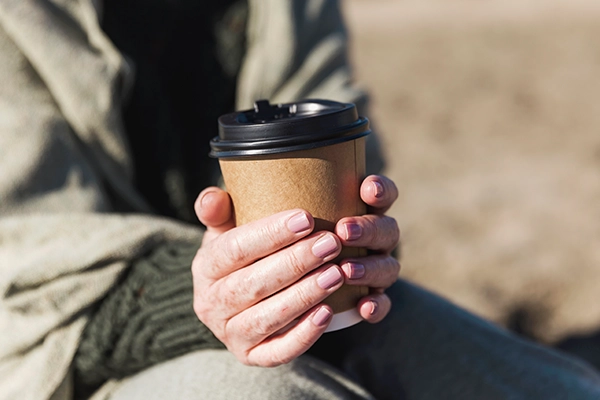Coffee is one of the most popular beverages around the world and many people rely on it to start their day. But did you know that when you drink coffee can have a significant effect on your energy levels? In this article, we will examine the best time to drink coffee so that you can get the most out of this pleasant drink.
Why is the time to drink coffee important?
The caffeine in coffee interferes with the hormone cortisol, which is responsible for regulating our sleep-wake cycle. The best time to drink coffee is when the body’s cortisol levels are decreasing. This will help you get the most out of the caffeine.

The best times to drink coffee
1. Between 9:30 and 11:30 AM: This time is usually after the peak of morning cortisol production and is the best time to drink coffee.
2. Between 1:30 PM and 3:30 PM: This time coincides with the natural drop in energy in the afternoon and can be a good time to drink a cup of coffee.
3. About 30-60 minutes before an important mental or physical activity: This is the best time to drink coffee if you want to prepare for a special event.
Times to avoid drinking coffee
1. Immediately after waking up: At this time, your body is producing cortisol and drinking coffee can cause caffeine resistance.
2. After 2 PM: Drinking coffee late in the day can disturb your sleep at night.
3. Right before bed: This is definitely **not the best time to drink coffee** as it can cause insomnia.
A scientific guide to optimizing caffeine consumption throughout the day
Optimum caffeine consumption throughout the day can have a dramatic effect on your energy levels and performance. Scientists have found that the best time to drink coffee is directly related to the body’s natural cortisol cycle. Here’s a scientific guide to optimizing your caffeine intake:
1. Aligning with the circadian rhythm: Our body works according to the circadian rhythm. Cortisol, the stress hormone involved in wakefulness, usually peaks between 8-9am, 12-1pm and 5:30-6:30pm. The best time to drink coffee is when cortisol levels are decreasing.
2. Delay your first cup of coffee: Although it may be tempting to drink coffee right after waking up, it’s better to wait. About 30 to 60 minutes after waking up is the best time to drink coffee because it interferes less with natural cortisol production.
3. Attention to the half-life of caffeine: Caffeine has a half-life of about 5 to 6 hours. This means that the best time to consume coffee is at least 6 hours before bedtime to avoid nighttime sleep disturbances.
4. intermittent consumption: instead of drinking a lot of coffee at one time, it is better to spread the consumption throughout the day. This method can help maintain a constant level of alertness.
5. Attention to individual differences: Sensitivity to caffeine is different in different people. Some people may need to adjust the best time to drink coffee based on their individual reactions.
By following these scientific principles, you can optimize your caffeine consumption and enjoy its benefits in the best way.
Benefits of drinking coffee during the day to increase energy
Consuming coffee at the right times can have significant benefits for increasing energy throughout the day. Knowing the best time to drink coffee can help you enjoy these benefits more effectively:
1. Increases alertness and concentration: Drinking coffee at the best time (usually between 9:30 and 11:30 am) can significantly increase your alertness and concentration. This is especially useful for starting the work or school day.
2. Improving physical performance: Drinking coffee about 30 to 60 minutes before exercise can improve your physical performance. This is the best time to drink coffee before sports activities.
3. Increasing metabolism: The caffeine in coffee can increase the body’s metabolism. Drinking coffee at the best time can help you burn more calories throughout the day.
4. Improve Mood: Coffee can trigger the release of dopamine and serotonin, which can improve your mood. Drinking coffee at the best time can help maintain a positive mood throughout the day.
5. Increasing productivity: By choosing the best time to consume coffee, you can increase your productivity throughout the day. This is especially helpful at times when you tend to experience low energy (like early afternoon).
6. Strengthening short-term memory: Studies have shown that caffeine can improve short-term memory. Drinking coffee at the best time, especially before important meetings or studying, can help improve memory performance.
7. Reduce mental fatigue: Drinking coffee at the best time can reduce mental fatigue and help you stay alert and active throughout the day.

Remember that the best time to drink coffee can be different for each person and depends on various factors such as age, weight, sensitivity to caffeine and sleep patterns. With experience and paying attention to your body’s reactions, you can find the best timing for coffee consumption and benefit from its benefits for increasing energy throughout the day.
Conclusion
In this article, we take a comprehensive look at the best time to drink coffee and its effect on increasing energy. What we’ve learned shows that the timing of coffee consumption plays an important role in reaping its benefits. We found that the best time to drink is directly related to the body’s natural cortisol cycle. In general, the right times to consume coffee are:
1. Between 9:30 and 11:30 am
2. Between 1:30 and 3:30 p.m
3. About 30 to 60 minutes before important mental or physical activities
Also, we learned that observing the best time to drink can bring many benefits, including increasing alertness and concentration, improving physical performance, increasing metabolism, improving mood, increasing productivity, strengthening short-term memory, and reducing mental fatigue. However, it’s important to remember that the best time to drink can vary from person to person. Factors such as age, weight, sensitivity to caffeine and sleep pattern can affect the body’s reaction to coffee. Therefore, it is recommended to find the best time to consume coffee according to your body’s reactions.










